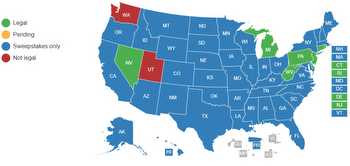E-Casino Era: How the US is Rethinking Online Gambling Boundaries

The United States has historically maintained a patchwork approach to gambling regulations. While the brick-and-mortar casino scene has been dominated by iconic locations like Las Vegas and Atlantic City, the rise of online casinos has prompted a nationwide introspection on the country’s gambling boundaries. The e-casino era is here, and the US is navigating this new terrain with a mix of caution and optimism.
From Federal to State Regulations
The crux of America’s online gambling dilemma lies in its federalist structure. While the federal government has often been wary of online casinos, individual states are increasingly moving toward legalization. States like New Jersey, Pennsylvania, and Michigan have led the charge, reaping economic benefits from taxes and job creation.
For instance, this article on Lucky Gambler about online gambling New Jersey scene shows that this industry grows quickly and can be successfully regulated. This trend is causing other states to rethink their stance and consider the potential advantages of embracing the e-casino revolution.
Evolving Public Perception
The digital age has significantly shifted public opinion on many matters, online gambling included. Millennials and Gen Z, who are accustomed to on-demand entertainment, view e-casinos as another legitimate form of digital recreation. This generational change in mindset is pushing lawmakers to reconsider outdated perceptions and to adapt to a more progressive outlook on online casinos.
The Safety and Technology Argument
One significant advantage of regulating and legalizing online gambling is the potential for increased safety. Illegal or unregulated online casinos can pose risks to users, from monetary scams to a lack of responsible gambling measures. By setting stringent guidelines, states can ensure that e-casinos operating within their boundaries are safe, transparent, and accountable.
Economic Stimulus
The potential for revenue generation through taxes and licensing fees is a compelling argument for states, especially those facing budget deficits. The success stories from early adopter states provide a blueprint for how online gambling can be a boon to local economies. Additionally, the industry promises a spectrum of job opportunities, including:
- Tech development;
- Digital marketing;
- Customer support;
- Game design.
Addressing Responsible Gambling
The e-casino era also brings challenges, chiefly around responsible gambling. The ease of access can exacerbate gambling addiction issues. Recognizing this, many states are implementing measures such as
- Self-exclusion lists;
- Betting limits;
- Mandatory reality checks to protect players.
Conclusion
The rise of online casinos in the US is reflective of a broader global trend. As technology advances and societal perceptions shift, it’s clear that the boundaries of gambling in the US are undergoing significant transformations.
While there are hurdles to overcome, particularly concerning responsible gambling and regulatory coherence, the potential benefits of a well-regulated e-casino industry cannot be ignored. The US is on the cusp of an e-casino revolution, and the next decade will be pivotal in shaping its trajectory.





































